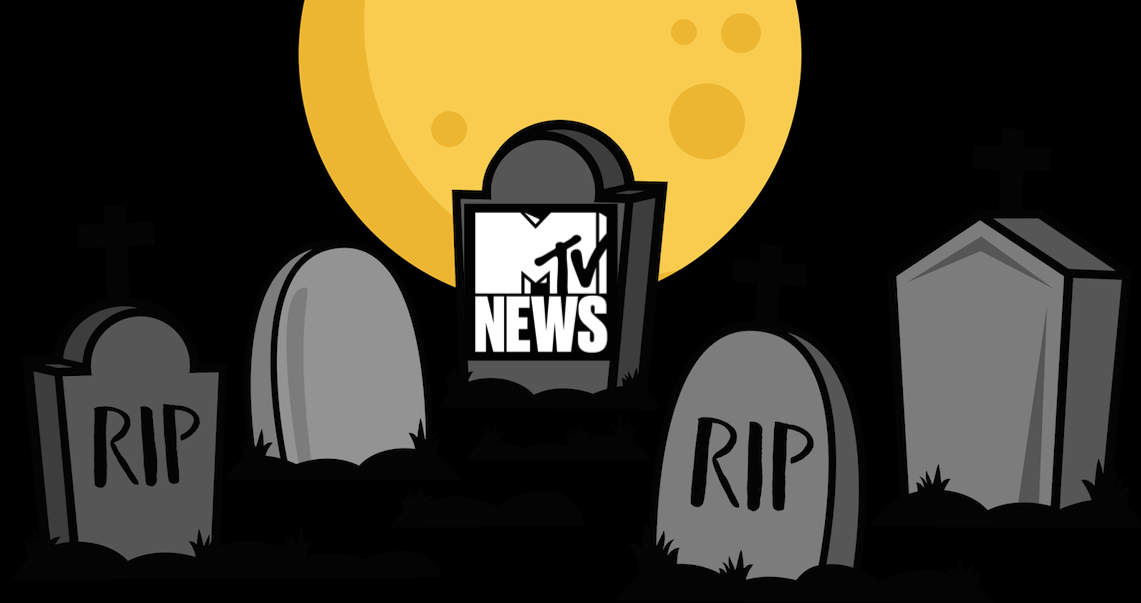The Death of MTV News, & Protecting Our Work From the Impermanence of the Internet

Last month the MTV News website went dark when its parent company, Paramount Global, made the decision to pull all of the site’s archives offline.
Over two decades of music journalism disappeared in an instant.
For some writers, it was the vast majority of their careers, and for some artists, it was a sweeping away of relevant documentation of their rise, and the accomplishments they achieved.
The action was one that reminded us that when it comes to the internet, corporations are still in control, and they will erase history in the name of the future, even a totally unknown future they haven’t put any actual thought into.
I’m not sure who flipped the proverbial switch at Paramount, but congrats on clearing up all that space … in a place that is literally endless space.
We should know by now the powers that be will always find a way to screw us over, even if it isn’t necessarily intentional, because, point blank – they’re never thinking about us. Our work is meaningless to them with the exception of its potential to make THEM money. This is why they’re totally fine callously erasing entire careers at the push of a button.
Our work is meaningful to us, though, and in many cases, it’s meaningful to history, as well.
So the biggest questions after all of this are – how do we now view, and treat, the internet in regards to journalism, and music, and how do we protect our work from disappearing?
I have a few ideas …
As journalists, we need to create our own safety nets
Over the course of my nearly 25 year career I’ve written for a plethora of websites that no longer exist. After one of the first major websites I wrote for closed up shop I was really upset that so much of my work interviewing major label artists had disappeared.
Interviews with LL Cool J, 50 Cent, T.I., Ludacris, The Lox, and many more were suddenly gone, with no explanation whatsoever.

At the time, my blog was more of a side project, but after building it up, anytime a site I’m writing for goes down I immediately repurpose the interviews here.
I keep all my interviews on my hard drive, and I’ve spent entire weekends formatting hundreds of them for Adam’s World, just so they’ll still be on the internet.
(As an aside, I’m sure those classic interviews I mentioned earlier are on a hard drive somewhere, and I’m also sure it would take a miracle to boot up those computers.)
Having a blog is now two-fold for me – I publish original content, AND it’s my safety net for when other sites that are featuring my work go down.
Every journalist should be protecting themselves like this. None of us should be putting all of our eggs into one basket, especially when someone else owns the basket.
And yes, I realize a major company hosts this blog, which is why I back up the content at least once a month. It’s a safety net for my safety net.
Musicians always need a plan B
Every artist should have a backup plan in place in case their major source of listenership disappears, and no one should be relying on just one streaming service to host their music.
You may think it sounds ridiculous – Spotify, or Bandcamp suddenly ceasing to exist – but just ask AOL, or MySpace what being #1 means. Ask Friendster, or Vine … wait, you can’t ask Friendster, or Vine, because they’re both totally gone.

Heck Soundcloud needed to be saved by Chance the Rapper, and the music that was posted on DatPiff is still around only because of the Internet Archive.
The good news for artists is that your music doesn’t live solely on the internet. You have it on hard drives, and even have hard copies, so your backup plan is already partly in place.
Oh, and when it comes to any articles written about you – save them as PDFs, so if the websites they’re on go down you can immediately put the articles on your own site.
We need to view the internet as an unreliable record of history
Back when I was college, which was during the dark ages of the internet (1996 - 2000), professors wouldn’t allow students to use the internet as a source. They said it wasn’t reliable, and didn’t count as any sort of verification of facts.
With a site as big as MTV News disappearing, we are on our way to having to board that train of thought once again.
We have to accept that we are nearing a future where the internet won’t have all the answers, because answers are being deleted on a regular basis.
Sadly, the utopic promise of a living record of history now looks about as realistic as the old “it will level the playing field” notion indie artists were once sold in regards to the internet.
To flip an Adele lyric – we could’ve had it all … but instead we’re at the mercy of the whims of major corporations.
We may not be able to take the power away from those corporations, but we can do our best to preserve our work, and save it from disappearing.

Comments